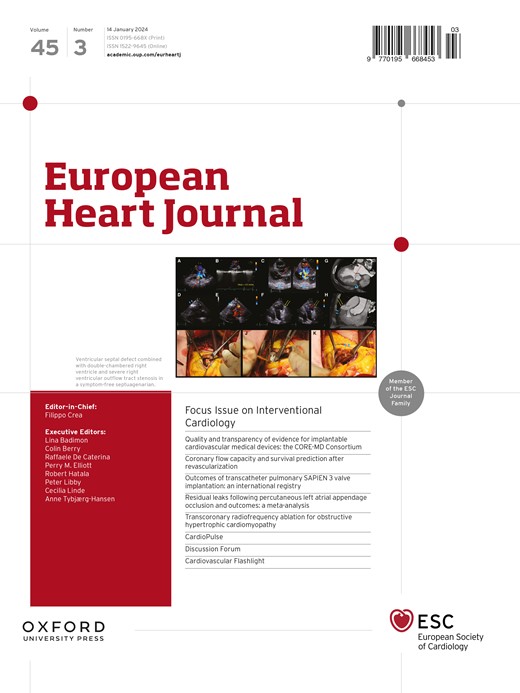Arachidonic acid fuels inflammation by unlocking macrophage protein phosphatase 5 after myocardial infarction.
IF 35.6
1区 医学
Q1 CARDIAC & CARDIOVASCULAR SYSTEMS
引用次数: 0
Abstract
BACKGROUND AND AIMS An overactive inflammatory response and immune cell infiltration following myocardial infarction (MI) impair cardiac tissue repair. This study investigates the mechanistic role of the arachidonic acid (AA) metabolic cascade in mediating post-MI inflammation. METHODS Single-cell RNA-sequencing analysis was performed to characterize cardiac macrophage heterogeneity in post-MI mice. Metabolomic analyses were conducted to profile polyunsaturated fatty acid metabolites in both plasma from MI patients and cardiac tissue from infarcted mice to identify key factors influencing MI progression. RESULTS Leukotriene B4 (LTB4), an AA metabolite, was consistently elevated in MI patients and mouse models, demonstrating significantly higher plasma concentrations in recurrent MI cases. Mechanistically, AA promotes nuclear translocation of protein phosphatase 5 (PP5), which subsequently dephosphorylates 5-lipoxygenase at Thr218, driving sustained LTB4 production. This process enhances CXCL13-mediated B-cell recruitment and amplifies inflammation through macrophage-B-cell crosstalk. Disruption of PP5 in mouse macrophages prevents these adverse changes. CONCLUSIONS The findings elucidate the conserved role of 5-lipoxygenase phosphorylation regulated LTB4 levels in MI and identify PP5 as a potential therapeutic target for the treatment of MI.花生四烯酸在心肌梗死后通过解锁巨噬细胞蛋白磷酸酶5来刺激炎症。
心肌梗死(MI)后过度活跃的炎症反应和免疫细胞浸润损害心脏组织修复。本研究探讨花生四烯酸(AA)代谢级联在心肌梗死后炎症中的作用机制。方法采用单细胞rna测序分析心肌梗死后小鼠心肌巨噬细胞异质性。代谢组学分析分析了心肌梗死患者血浆和梗死小鼠心脏组织中的多不饱和脂肪酸代谢物,以确定影响心肌梗死进展的关键因素。结果AA代谢物柳三烯B4 (LTB4)在心肌梗死患者和小鼠模型中持续升高,复发性心肌梗死患者的血浆浓度显著升高。在机制上,AA促进蛋白磷酸酶5 (PP5)的核易位,随后在Thr218位点使5-脂氧合酶去磷酸化,从而驱动LTB4的持续产生。这一过程增强了cxcl13介导的b细胞募集,并通过巨噬细胞- b细胞串扰放大炎症。小鼠巨噬细胞中PP5的破坏可阻止这些不良变化。结论研究结果阐明了5-脂氧合酶磷酸化在心肌梗死中调控LTB4水平的保守作用,并确定PP5是治疗心肌梗死的潜在靶点。
本文章由计算机程序翻译,如有差异,请以英文原文为准。
求助全文
约1分钟内获得全文
求助全文
来源期刊

European Heart Journal
医学-心血管系统
CiteScore
39.30
自引率
6.90%
发文量
3942
审稿时长
1 months
期刊介绍:
The European Heart Journal is a renowned international journal that focuses on cardiovascular medicine. It is published weekly and is the official journal of the European Society of Cardiology. This peer-reviewed journal is committed to publishing high-quality clinical and scientific material pertaining to all aspects of cardiovascular medicine. It covers a diverse range of topics including research findings, technical evaluations, and reviews. Moreover, the journal serves as a platform for the exchange of information and discussions on various aspects of cardiovascular medicine, including educational matters.
In addition to original papers on cardiovascular medicine and surgery, the European Heart Journal also presents reviews, clinical perspectives, ESC Guidelines, and editorial articles that highlight recent advancements in cardiology. Additionally, the journal actively encourages readers to share their thoughts and opinions through correspondence.
 求助内容:
求助内容: 应助结果提醒方式:
应助结果提醒方式:


